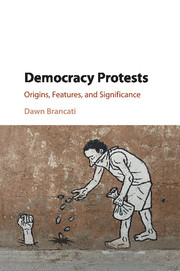Book contents
- Frontmatter
- Dedication
- Contents
- List of Figures
- List of Tables
- Acknowledgments
- 1 Introduction
- 2 Characteristics of Democracy Protests
- 3 Relating Economic Crises to Democracy
- 4 Analyzing the Rise of Democracy Protests
- 5 Analyzing Elections as Trigger Events
- 6 Historical Trends in Government Responses
- 7 Analyzing Political Accommodation
- 8 Historical Trends in Democratization
- 9 Analyzing Democratization
- 10 Conclusion
- Appendix: Data and Measures
- References
- Index
5 - Analyzing Elections as Trigger Events
Published online by Cambridge University Press: 05 September 2016
- Frontmatter
- Dedication
- Contents
- List of Figures
- List of Tables
- Acknowledgments
- 1 Introduction
- 2 Characteristics of Democracy Protests
- 3 Relating Economic Crises to Democracy
- 4 Analyzing the Rise of Democracy Protests
- 5 Analyzing Elections as Trigger Events
- 6 Historical Trends in Government Responses
- 7 Analyzing Political Accommodation
- 8 Historical Trends in Democratization
- 9 Analyzing Democratization
- 10 Conclusion
- Appendix: Data and Measures
- References
- Index
Summary
In this chapter, I analyze quantitatively the importance of elections in triggering democracy protests. Elections, as the previous chapter demonstrates, are a significant event around which democracy protests occur. They also, as I seek to show in this chapter, increase the likelihood that crises will incite protests because they make the link between a lack of democracy in countries and poor economic conditions more salient. During crisis-ridden elections, not only do opposition candidates tend to campaign against governments in terms of the latter's economic failures, but incumbent governments, increasingly unpopular and financially strapped, are also more likely to manipulate elections in order to remain in power, and to do so by much tighter margins of victory. Electoral fraud, especially that which prevents the public from dislodging incumbent governments from power, incentivizes opposition parties and their supporters in crisis periods to challenge elections through mass demonstrations.
To investigate these claims, the analysis to follow examines each of these links between elections and the state of the economy. The analysis spans 1454 national presidential and legislative elections across 170 states between 1989 and 2011. One hundred forty-one of these elections triggered democracy protests. Unless otherwise noted, information about these elections, such as when they occurred, who won the elections, and by what margin, is based on a number of sources including: the African Elections Database (Nunley 2004–2012), the Global Elections Database (Brancati 2007), and the Oxford series of election data handbooks (Nohlen, Krennerich, and Thibaut 1999; Nohlen 2005; Nohlen and Stover 2010). See the appendix for detailed information about the data and measures used in this analysis.
In support of these claims, the statistical analysis shows that, in general, democracy protests are more likely to occur in countries in response to elections when economic conditions are poor, controlling for other influences, such as democracy and state repressiveness. Economic conditions are considered poor when growth is low, when inflation and unemployment are high, and when individuals negatively evaluate economic conditions in their country and their own standard of living. When economic conditions are poor, electoral fraud is also more likely to occur, which, in turn, is associated with a higher likelihood of democracy protests to occur.
- Type
- Chapter
- Information
- Democracy ProtestsOrigins, Features, and Significance, pp. 84 - 106Publisher: Cambridge University PressPrint publication year: 2016
- 1
- Cited by



